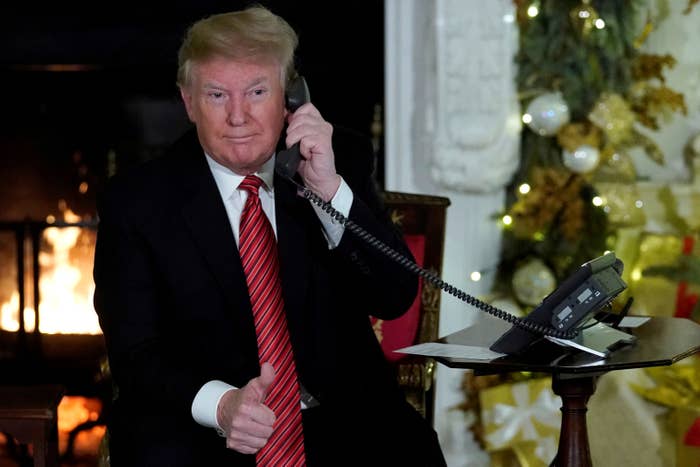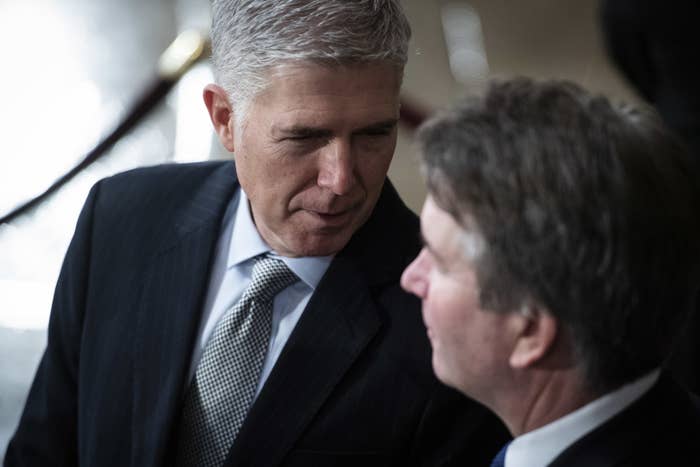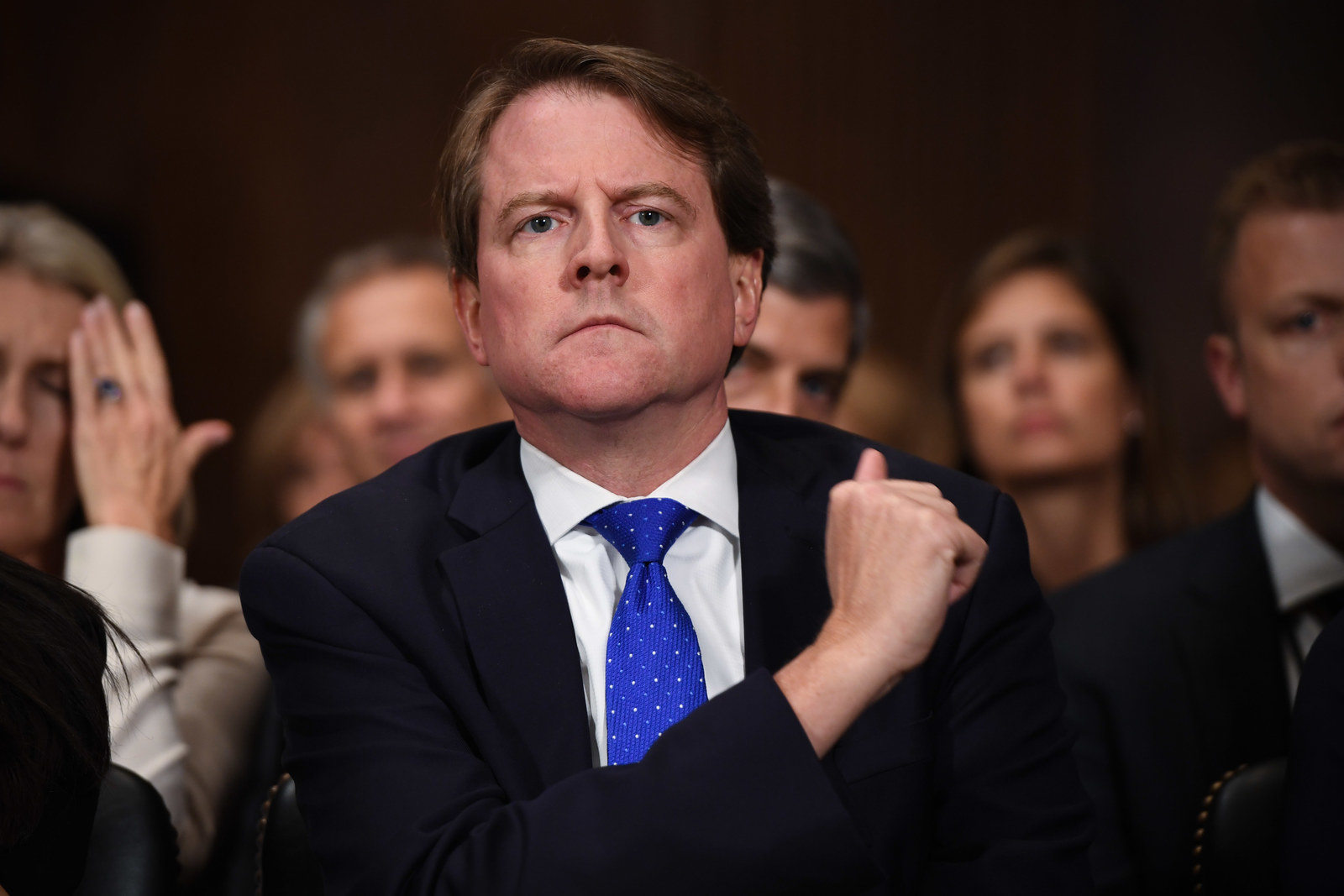
WASHINGTON — President Donald Trump has gotten more judges confirmed to federal appeals courts in his first two years in office than any president in modern history. With 30 new circuit judges on the bench, and a dozen nominees pending in the Senate, Trump has more than made good on a campaign promise to reshape the judiciary.
These judges have lifetime appointments, but they haven’t wasted time asserting themselves on everything from gun rights and abortion to political speech and the power of federal agencies — subjects at the heart of partisan battles leading up to their confirmation. Conservatives are thrilled. Liberals are dismayed, though unsurprised.
Going into the new year, Republicans will lose control of the House of Representatives, but they’re in an even stronger position in the Senate — they’ll have a 53–47 majority, giving them that much more wiggle room to get judicial nominees confirmed even if one or two GOP members object. Democrats hope the failure of a handful of nominees is a sign that Republicans won't always vote as a monolith, but the numbers are against them.
The fight over Justice Brett Kavanaugh’s nomination got the most attention of any judicial nomination in 2018, but the US Supreme Court hears a relatively small proportion of cases each year. Putting judges on the federal appeals courts — courts that set precedent for federal district courts and can only be reversed by the Supreme Court — has been, and continues to be, a top priority for the White House and Senate Republicans.
There are 167 judgeships on the regional appeals courts, not counting senior judges who handle a smaller docket and don’t normally participate when the full court hears cases. Trump has already gotten 30 appeals judges confirmed, making up 18% of those seats. That’s how many appeals judges were confirmed during Obama’s entire first term.
Many could be there for decades. Trump’s first White House counsel Don McGahn placed a premium on younger nominees who would make the most of a lifetime appointment, and largely succeeded. Half of the 30 judges confirmed so far are in their forties, and two just turned 40 this year. As is true of appeals court nominees regardless of the party in power, many of these judges came through elite law schools and clerked for Supreme Court justices. They’re mostly men, and nearly all are white.
The new crop of appeals judges proved their conservative bona fides long before they were nominated. A review of their Senate questionnaires shows 24 of the 30 new appeals judges have been members of the Federalist Society, an influential conservative lawyers group. Many also reported working for Republican elected officials and being members of the Republican National Lawyers Association.
Four judges reported volunteering or doing other campaign work for a Republican candidate in the 2016 presidential election — Sens. Ted Cruz, Marco Rubio, Lindsay Graham, and Rand Paul. None reported volunteering or working for Trump.
The judges bring a diverse set of experiences to the bench — they worked in state and federal courts and prosecutor offices, private practice, corporations, Congress and the White House, and law schools — but few worked in areas more likely to show up on the résumés of judges confirmed under Democratic presidents, such as civil rights organizations, legal aid groups, or public defender offices.

Liberal advocacy groups say these judges aren’t just run-of-the-mill conservatives but represent the extreme right. Elliot Mincberg, a senior fellow at People for the American Way, pointed to what newly confirmed judges have already written on hot-button issues like the Second Amendment and abortion, and rulings they’ve joined on employment discrimination, immigration, and criminal justice, as proof of the “strong ideological orientation” groups like his are worried about.
Federal appeals judges confirmed under Trump so far have already “done a huge amount of damage from our perspective,” Mincberg.
Sharon McGowan, legal director of Lambda Legal, said they’re looking ahead with some anxiety to cases that are just starting to go up on appeal — for instance, a ruling earlier this month by Judge Reed O’Connor in Texas declaring the entire Affordable Care Act invalid. Democratic state attorneys general have vowed to appeal that decision to the US Court of Appeals for the 5th Circuit, where there are already five new judges confirmed under Trump.
“The notion that they are going to be the check on decisions like the kinds of decisions that we’re seeing out of Judge O’Connor’s chambers are things that should give people pause,” McGowan said.
Conservatives agree the new judges are making big moves early on — John Malcolm, a senior legal fellow at the Heritage Foundation, repeatedly used the word “bold” to describe some of these writings — and when asked to identify opinions of note so far, they praise the very same cases that liberals lament.
“It’s calling the court back to its constitutional roots,” said Carrie Severino, chief counsel and policy director of the Judicial Crisis Network. “For separation of powers, or the fact that the Second Amendment is not the ugly stepchild of the Bill of Rights, the importance of religious freedom … these are all thoroughly rooted in the Constitution itself, and that’s why they’re so important.”
Malcolm said he’d like to see more progress on district court judges but was pleased with Trump’s early focus on the appeals courts.
“Overall, he’s made a significant down payment to prioritize judges,” Malcolm said.
Abortion
Abortion access and the future of Roe v. Wade has long been a flashpoint in the fight over judicial nominees, and not just for the Supreme Court. Senate Judiciary Committee Democrats routinely ask Trump’s nominees if they believe Roe was correctly decided, and nominees typically reply that they’re either forbidden from giving an opinion because of judicial ethics rules or that all current Supreme Court precedent is correct.
New judges haven’t had many opportunities to take up abortion cases, but 5th Circuit Judge James Ho, confirmed in January, was part of a three-judge panel that heard a case this year related to Texas regulations around the handling of fetal remains, including after an abortion. In July, the 5th Circuit panel reversed a lower court order requiring the Texas Conference of Catholic Bishops to comply with a subpoena for documents.
Ho joined Jones’ opinion, and wrote his own, one-page concurring opinion. He called abortion a “moral tragedy,” and criticized the district judge for giving the bishops a tight deadline — on a Sunday — to comply with the subpoena. The lower court proceedings were “troubling,” Ho wrote.
“They leave this Court to wonder if this discovery is sought … to retaliate against people of faith for not only believing in the sanctity of life — but also for wanting to do something about it,” he wrote.

Guns
In June, New Jersey became the latest state to respond to mass shootings by passing limits on the number of bullets that a single gun can hold. Earlier this month, a divided three-judge panel of the 3rd Circuit upheld the law. The two judges in the majority wrote that the law “reasonably fits the State’s interest in public safety and does not unconstitutionally burden the Second Amendment’s right to self-defense in the home.”
Judge Stephanos Bibas, a former law professor confirmed in November 2017, disagreed. He wrote that because the law struck at the “core right” of the Second Amendment to keep weapons at home for self-defense, the court should have applied the most stringent type of scrutiny. He wrote that New Jersey failed to present enough evidence that these types of magazine limits would make mass shootings less deadly.
“The Second Amendment is an equal part of the Bill of Rights.”
“The Second Amendment is an equal part of the Bill of Rights. We must treat the right to keep and bear arms like other enumerated rights, as the Supreme Court insisted in Heller,” Bibas wrote, referring to a 2008 Supreme Court gun rights decision. “We may not water it down and balance it away based on our own sense of wise policy.”
Bibas isn’t the only new judge with strong thoughts about the Second Amendment. In July, the 5th Circuit split on whether to reconsider a three-judge panel decision upholding federal laws restricting interstate sales of guns. Eight judges voted to leave that ruling intact, while seven judges voted to rehear the case. Of the seven judges who wanted to reconsider it, four were confirmed under Trump.
Ho and Judge Don Willett, also confirmed in January 2018, wrote dissents explaining why they believed the court should rehear the case. Willett wrote that the Second Amendment had been “scorned as fringe,” but “is neither second class, nor second rate, nor second tier.” He argued that the full court should definitively rule on what test to use to determine the constitutionality of these types of gun laws.
Ho wrote that he agreed with the Texas judge who initially blocked enforcement of the interstate sales laws before being reversed on appeal, saying the judge “deserves recognition for standing against the tide.”
“No one disputes that the Government has a compelling interest in preventing dangerous individuals from purchasing handguns. But as the district court held, and the panel properly assumed, handgun restrictions must be narrowly tailored to serve that interest,” Ho wrote. “Law-abiding Americans should not be conflated with dangerous criminals. Constitutional rights must not give way to hoplophobia.” (“Hoplophobia” is a term created by a firearms instructor in the 1960s to refer to a fear of guns.)
Political speech
As both parties continue to argue over the effects of the Supreme Court’s Citizens United decision, remains a national flashpoint, two new judges wrote dissents this year expressing an interest in rolling back state laws that restrict the flow of money in elections and who must register as a lobbyist.
In February, a 5th Circuit panel upheld a campaign contribution limit imposed by the city of Austin, Texas. In April, a majority of judges on the court declined to reconsider the case. Ho wrote a dissenting opinion, saying he would have held that the contribution limit violated the First Amendment. He also used his dissent to take a jab at “big government.”
“If you don’t like big money in politics, then you should oppose big government in our lives.”
“To be sure, many Americans of good faith bemoan the amount of money spent on campaign contributions and political speech. But if you don’t like big money in politics, then you should oppose big government in our lives. Because the former is a necessary consequence of the latter,” Ho wrote.
Last month, a divided 8th Circuit panel rejected an effort to block Missouri lobbying disclosure laws that governed who had to register as a lobbyist. Judge David Stras, confirmed in January 2018, dissented, finding the lobbying registration rules too restrictive. He wrote that Missouri’s interest in transparency alone — absent any money or things of value changing hands — wasn’t enough for the law to survive.
“The court, like Missouri, fails to explain why compiling a public list of people who are engaging in core political speech is ‘important,’” Stras wrote, warning that a broad interpretation could sweep up “politically active” citizens and require them to register as lobbyists, too.
Agency power
Rolling back federal regulations and restricting the power of agencies was a priority for McGahn, and he’s spoken before about how he sees judges as part of that process. Civil rights and environmental groups have warned that chipping away at agency deference will lead to weaker environmental protections and other regulations of private industry.
Judge Amul Thapar of the 6th Circuit — Trump’s first lower court nominee, long backed by Senate Majority Leader Mitch McConnell — has made clear his disapproval of courts deferring too much to agencies. On Dec. 18, he wrote the majority opinion in a challenge to a decision by the Board of Immigration Appeals ordering the deportation of an undocumented immigrant who pleaded guilty to a home invasion. The court reversed the board’s decision and sent it back for more proceedings because the record wasn’t clear, but Thapar first took the opportunity to dig at judges for how much weight they gave to agencies.
“All too often,” Thapar wrote, courts concluded that laws were ambiguous, and then applied a longstanding legal principle of deferring to an agency’s interpretation under a landmark Supreme Court case on the issue, known as Chevron.
“When dealing with agencies, this abdication by ambiguity is even more tempting — and even more problematic,” Thapar wrote.
In October, Thapar took a swing at another legal doctrine that helps agencies win in court, based on a Supreme Court case known as Auer — under Auer, agencies get deference in interpreting their own rules. The case involved a challenge to how the US Sentencing Commission interpreted its guidelines. The three-judge panel sided with the commission, but Thapar wrote a separate, concurring opinion arguing precedents that gave agencies deference “deserve renewed and much-needed scrutiny.”
“In essence, the argument boils down to this — the government is populated by experts and when they speak we should tip the scales of justice in their favor. Such deference is found nowhere in the Constitution — the document to which judges take an oath,” Thapar wrote.
In a footnote, Thapar went even farther, suggesting judges who deferred to the government as both a party in a case and the interpreter of the law might be “violating our judicial canons.”

